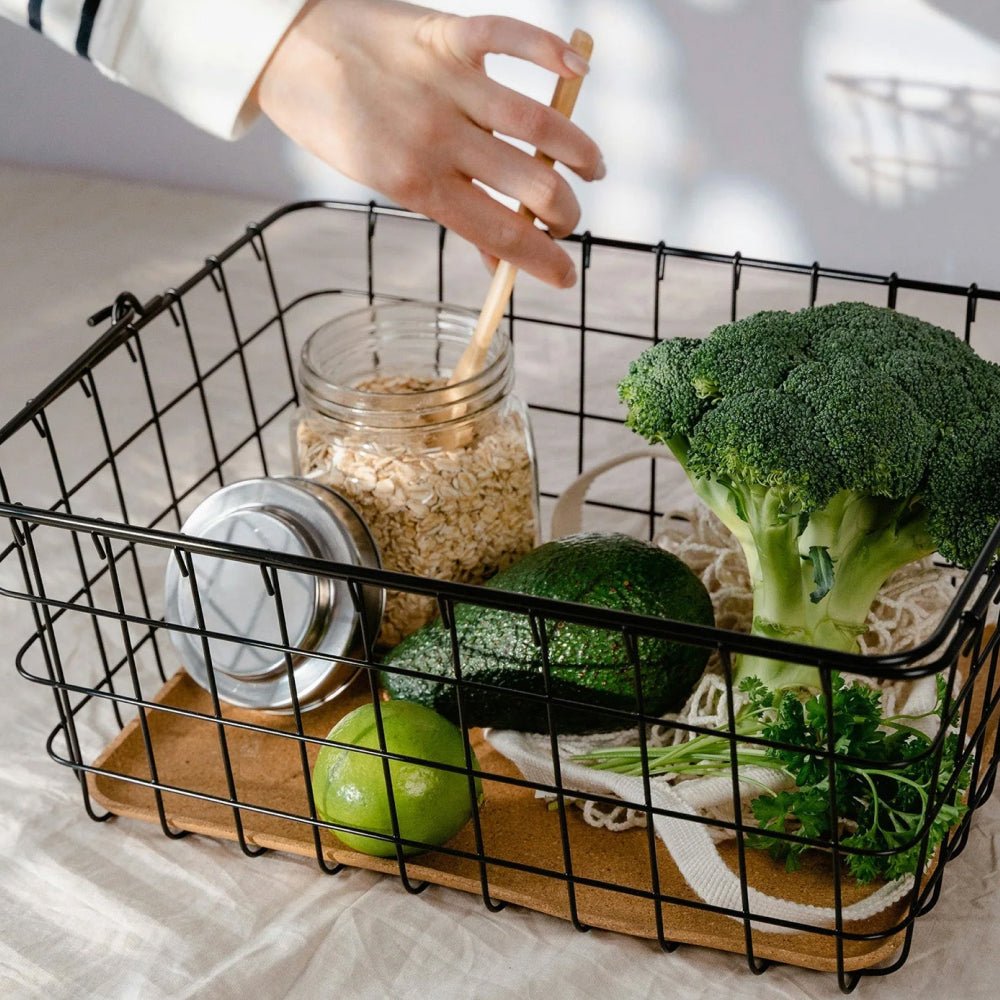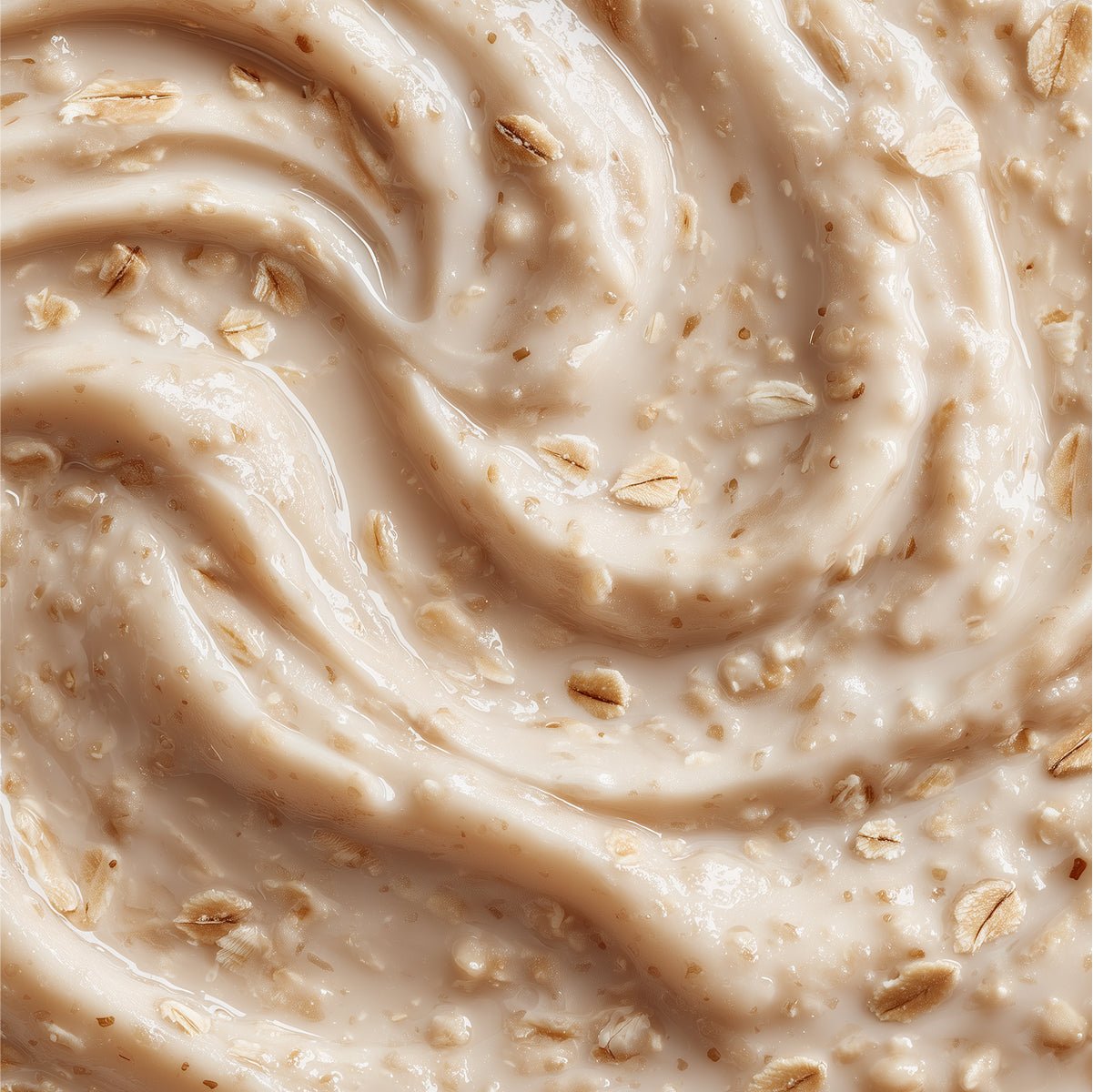There is no clear evidence establishing a direct link between diet and eczema. However, the National Library of Medicine (NIH) suggests that “dietary elimination may lead to a slight improvement.” If this is the case, how can you adjust your diet to include foods that may help reduce eczema symptoms?
Today's blog will suggest the 6 best foods that reduce eczema inflammation and strengthen your skin’s barrier. In particular:
- Foods high in omega-3 fatty acids
- Probiotic foods
- Foods high in flavonoids
- Vegetables and fruits high in Vitamin C
- Potassium-rich foods
- Foods with high skin protection and building values
Foods High In Omega-3 Fatty Acids
Omega-3 fatty acids help reduce leukotriene B4, an inflammatory substance that contributes to eczema. Foods rich in omega-3 fatty acids are among the top choices for reducing eczema symptoms. Due to their powerful anti-inflammatory properties, these foods are the first choice in the list of foods that help reduce eczema, alleviate skin irritations, prevent flare-ups, and help maintain skin hydration.
Many people will likely prefer omega-3 fatty acids in some types of fish, like salmon, herring, mackerel, and sardines. However, you can use similar resources: nuts, vegetables, plant oils, or other supplements. Consider incorporating a Mediterranean diet that emphasizes omega-3 fatty acids and quercetin, a powerful antioxidant known to reduce inflammation. This dietary approach may help improve skin health and alleviate symptoms associated with eczema.
Probiotic Foods
According to the Journal of Health, Population, and Nutrition, “probiotics are an immunomodulator that can enhance the immune control of atopic dermatitis.” Probiotics are live bacteria and yeasts that can restore any imbalance in the normal intestinal and strengthen your immune system. They also partly reduce the risk of skin irritations and support your skin cell building.
Probiotic-rich natural foods include yogurt, miso soup, kombucha, kefir, sauerkraut, tempeh, and pickles. In addition, you can use probiotic nutritional supplements. If considering probiotic nutritional supplements, it's best to discuss these products with your health provider to determine the best options tailored to your goals.
Foods High In Flavonoids
You can incorporate foods rich in flavonoids into your diet to help manage eczema. Flavonoids contain potent nutrients that can reduce inflammation and support immune balance, benefiting various skin conditions. Research suggests that certain flavonoid-based products show promise as preventative treatments in skincare. Additionally, flavonoids possess wound-healing properties that may help alleviate eczema symptoms.
Some foods rich in flavonoids include apples, berries, onions, and dark leafy greens such as kale and spinach. These can be added to your daily diet to improve eczema symptoms, reduce unexpected flare-ups, and strengthen your skin’s barrier. Flavonoids contain powerful nutrients to dampen inflammation and rebalance the immune system for several skin disorders.
Vegetables And Fruits That Are High In Vitamin C
Vegetables and fruits are high in vitamin C (known for their anti-inflammatory properties. This means that they can help reduce redness, swelling, and other signs of inflammation) and are always top foods that help reduce eczema effectively. Vitamin C is an antioxidant that can decrease the level of nickel absorption to protect the body from allergic responses.
Oranges, bell peppers, limes, pineapple, mangoes, and cauliflower are best examples of vitamin C-rich foods to eat to reduce eczema. Notably, consuming a 7.5 - 50-gram dose might reduce allergy symptoms like itching or sneezing.
Potassium High Foods
Besides omega-3 fatty acids, potassium is another ingredient in foods to help reduce eczema. Similarly, it has the potential against inflammation to reduce eczema symptoms effectively. potassium is considered 'alkaline food' (or fruits), and a more alkaline diet is thought to support liver function, helping your body eliminate the toxins that are contributing to your eczema symptoms. To balance your diet with potassium, consider several food resources, including bananas, sweet, white beans, salmon, and acorn squash.
Foods That Improve Skin Health And Overall Well-Being
The final recommendation relates to what foods help reduce eczema, and improve skin health and overall well-being. These foods include healthy properties, like vitamin C, amino acids, omega-3 acids, vitamin E, silica, and vitamin D. Vitamin D may have a positive effect on eczema symptoms due to its immune-regulating properties and ability to affect gene expression both topically and orally. If you still need more suggestions, we recommend preparing your meals with buckwheat, green onions, chicken broth, or oats. Oats are an amazing food for managing eczema flare-ups due to their composition of vitamin E, zinc, and silica, which combine to help strengthen your skin.
Foods To Avoid If You Have Eczema
Now that you have grasped foods that help reduce eczema, it’s time to consider foods to avoid to protect your skin health. Below are some common food allergies related to eczema flare-ups.
- Personal food allergens;
- Fast foods (e.g., fried chicken, oily burgers);
- Processed foods (e.g., snack bars, canned seafood);
- Sugary treats (e.g., sweetened cereals, sodas);
- Snack items (e.g., chips, biscuits, crackers, cheese);
- Gluten-based products (e.g., beer, bread, pastries);
- Dairy products (e.g., milk, cream, butter).
Typically, “delayed” food-sensitive eczema reactions can appear between 6 and 48 hours. Keep a food diary and track your symptoms to help identify potential triggers.
Other Remedies To Help Reduce Eczema
To control your eczema, you should not only focus on what foods reduce eczema symptoms but also build a skincare routine with healthy therapies. In particular:
- Bathe with purpose: Hot water might feel good on irritated skin and temporarily stop itching, but it will dry out your skin and lead to eczema flare-ups. Showering or bathing in lukewarm water instead can soothe skin and reduce eczema symptoms
- Moisturize regularly: Emollients are moisturizing treatments applied directly to the skin to soothe and hydrate it. They cover the skin with a protective film to trap moisture. They are often used to help manage dry, itchy, or scaly skin conditions such as eczema, psoriasis, and ichthyosis. Unlike cosmetic moisturizers, emollients are unperfumed and do not have ‘anti-ageing’ additives. They are safe, effective, and can added to your skincare routine.
- Manage your stress: You can perform light exercises like ballet, tai chi, or yoga to give your body a balance from stress and prevent triggering eczema flare-ups.
- Have a botanical skincare routine: Some products with natural ingredients help prevent the risk of irritating eczema-prone skin without side effects, such as olive squalene, urea, tamanu oil, emu oil, etc. Consider Phoilex’s Active ReLeaf Spot Gel, which includes all of those natural ingredients.
Currently, Phoilex provides a directory of botanically derived skin care products. The following products can improve your chronic skin conditions thanks to their antioxidant, anti-inflammatory, and soothing properties.
- Active ReLeaf Spot Gel: A remarkable steroid-free solution with a unique Phyto-Active Blend™ designed to manage eczema symptoms. It offers immediate relief by soothing itchy skin, reducing redness, and strengthening the skin barrier for long-term improvement.
- Liverty Dynamic Drops: Featuring full-spectrum CBD, these drops promote healthy liver function and help prevent triggers for eczema and psoriasis. By targeting internal inflammation in the nervous system, they support healthier skin from within.
- ReLeaf and Recover Set: Combines Active ReLeaf Spot Gel and Liverty Dynamic Drops.
Take Control Of Eczema With Phoilex
With the 6 best foods that help reduce eczema, we hope you can develop a balanced diet to support your eczema treatments. Whatever food you select, you should know how to combine them to prevent side effects.
Explore more helpful tips, tricks, and resources for managing eczema and enhancing your skin's health right here at Phoilex.
Frequently Asked Questions!
Q: How do omega-3 fatty acids help reduce eczema symptoms?
A: Omega-3 fatty acids work by reducing leukotriene B4, an inflammatory substance that contributes to eczema flare-ups. They help maintain skin hydration and decrease inflammation, with the best sources being fatty fish like salmon and mackerel, as well as nuts and plant oils.
Q: Which probiotic foods are most effective for managing eczema?
A: The most effective probiotic foods for eczema management include yogurt, miso soup, kombucha, kefir, and sauerkraut. These foods contain live bacteria that help strengthen the immune system and reduce skin irritations by restoring balance to the intestinal flora.
Q: Can changing my diet really help improve my eczema?
A: While there's no direct cure through diet alone, the National Library of Medicine suggests that dietary modifications can lead to symptom improvement. A Mediterranean diet rich in omega-3 fatty acids and quercetin has shown particular promise in reducing eczema symptoms and promoting healthier skin.
Q: What role do flavonoids play in reducing eczema symptoms?
A: Flavonoids are powerful antioxidants that help reduce inflammation associated with eczema and strengthen the skin barrier. Foods rich in flavonoids, particularly those found in the Mediterranean diet, can help protect against skin irritation and support overall skin health.
Q: How important is Vitamin C in managing eczema through diet?
A: Vitamin C plays a crucial role in skin health by supporting collagen production and strengthening the skin barrier function. Consuming vegetables and fruits high in Vitamin C can help reduce inflammation and promote faster healing of eczema-affected skin.
Q: What are the best potassium-rich foods for eczema management?
A: Potassium-rich foods help maintain proper skin hydration and support the skin's barrier function. The best sources include bananas, sweet potatoes, avocados, and leafy green vegetables, which can help reduce eczema symptoms when incorporated into a balanced diet.
References:
- Oykhman, P., Dookie, J., Al-Rammahy, H., de Benedetto, A., Asiniwasis, R. N., LeBovidge, J., Wang, J., Ong, P. Y., Lio, P., Gutierrez, A., Capozza, K., Martin, S. A., Frazier, W., Wheeler, K., Boguniewicz, M., Spergel, J. M., Greenhawt, M., Silverberg, J. I., Schneider, L., & Chu, D. K. (2022). Dietary Elimination for the Treatment of Atopic Dermatitis: A Systematic Review and Meta-analysis. The Journal of Allergy and Clinical Immunology: In Practice, 10(10). https://doi.org/10.1016/j.jaip.2022.06.044
- Sawada, Y., Saito-Sasaki, N., & Nakamura, M. (2021). Omega 3 Fatty Acid and Skin Diseases. Frontiers in Immunology, 11. https://www.ncbi.nlm.nih.gov/pmc/articles/PMC7892455/pdf/fimmu-11-623052.pdf
- Umborowati, M. A., Damayanti, D., Anggraeni, S., Endaryanto, A., Surono, I. S., Effendy, I., & Prakoeswa, C. R. S. (2022). The role of probiotics in the treatment of adult atopic dermatitis: a meta-analysis of randomized controlled trials. Journal of Health, Population, and Nutrition, 41(1). https://doi.org/10.1186/s41043-022-00318-6
- Papapostolou, N., Xepapadaki, P., Gregoriou, S., & Makris, M. (2022). Atopic Dermatitis and Food Allergy: A Complex Interplay What We Know and What We Would Like to Learn. Journal of Clinical Medicine, 11(14), 4232. https://doi.org/10.3390/jcm11144232
- Hunninghake, R. (2014). Effect of high dose vitamin C on Epstein-Barr viral infection. Medical Science Monitor, 20, 725–732. https://doi.org/10.12659/msm.890423
Read more

6 Best Diets To Reduce Eczema: Foods To Soothe Irritated Skin Imagine overeating dairy and your skin appears to have many red patches. There is a strong connection between what you eat and how fo...

Is there anything smoother to the touch than a baby’s skin? While babies have enviably soft skin, this often comes with increased sensitivity, as their epidermis is still developing. This sensitiv...
